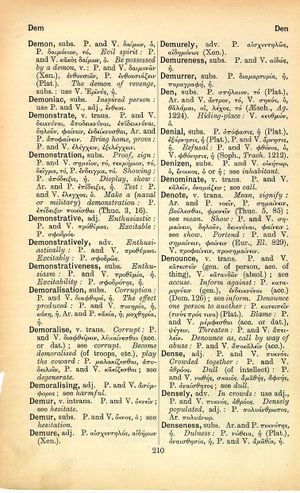denounce: Difference between revisions
From LSJ
Δαίμων ἐμαυτῷ γέγονα γήμας πλουσίαν → Malus sum mihimet ipse Genius, ducta divite → Ich stürzt' mich selbst ins Unglück durch die reiche Frau
(Woodhouse 2) |
(CSV3) |
||
| Line 1: | Line 1: | ||
{{ | {{Woodhouse1 | ||
| | |Text=[[File:woodhouse_210.jpg|thumb|link={{filepath:woodhouse_210.jpg}}]]'''v. trans.''' | ||
P. and V. κατειπεῖν (gen. of <b class="b2">person</b>, acc. of <b class="b2">thing</b>), V. καταυδᾶν (absol.); see [[accuse]]. | |||
<b class="b2">Inform against</b>: P. καταμηνύειν (gen.), ἐνδεικνύναι (acc.) (Dem. 126); see [[inform]]. | |||
<b class="b2">Denounce one person to another</b>: P. κατειπεῖν (τινὸς [[πρός]] τινα) (Plat.). | |||
<b class="b2">Blame</b>: P. and V. μέμφεσθαι (acc. or dat.), ψέγειν. | |||
<b class="b2">Threaten</b>: P. and V. ἀπειλεῖν. | |||
<b class="b2">Denounce as, call by way of abuse</b>: P. and V. ἀποκαλεῖν (acc.). | |||
}} | }} | ||
Revision as of 09:27, 21 July 2017
English > Greek (Woodhouse)
v. trans.
P. and V. κατειπεῖν (gen. of person, acc. of thing), V. καταυδᾶν (absol.); see accuse.
Inform against: P. καταμηνύειν (gen.), ἐνδεικνύναι (acc.) (Dem. 126); see inform.
Denounce one person to another: P. κατειπεῖν (τινὸς πρός τινα) (Plat.).
Blame: P. and V. μέμφεσθαι (acc. or dat.), ψέγειν.
Threaten: P. and V. ἀπειλεῖν.
Denounce as, call by way of abuse: P. and V. ἀποκαλεῖν (acc.).

